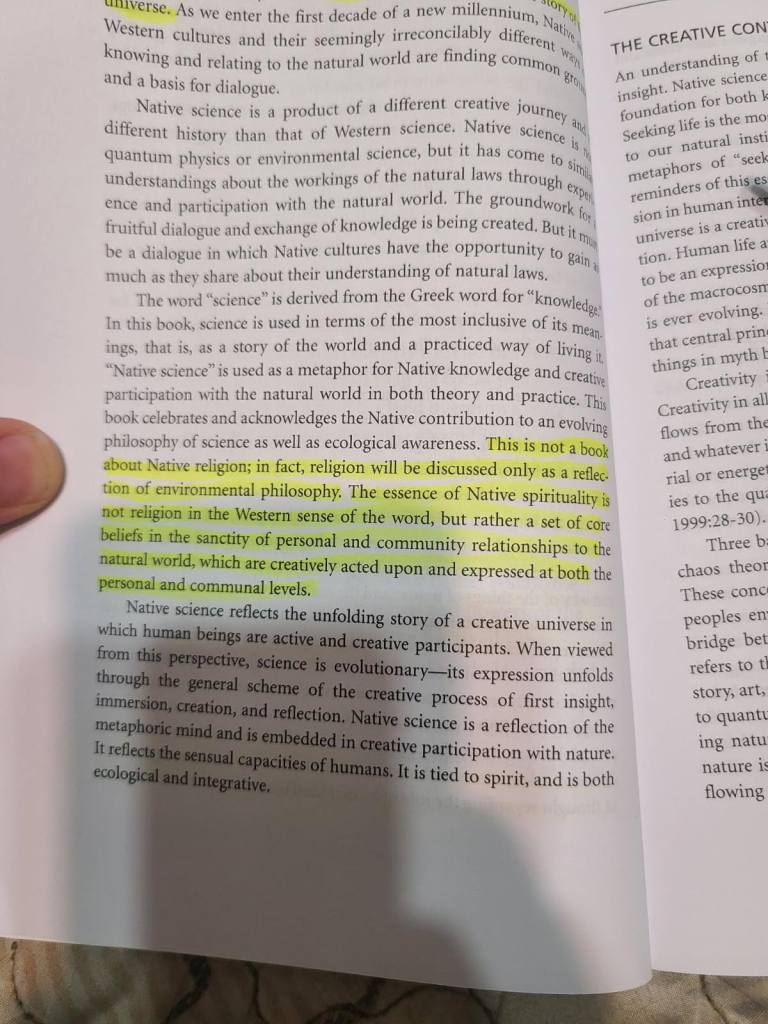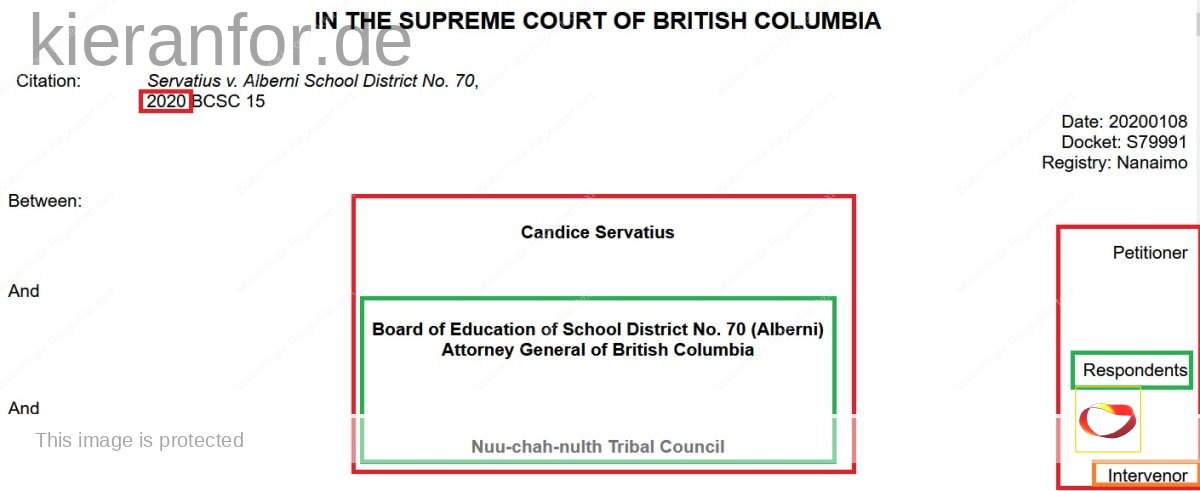Some Knowledge is Sacred and Only Shared With Permission and/or in Certain Situations
Header image: Modified screenshot from bccourts.ca
“Exploring Indigenous knowledge in the classroom was challenged and struck down in the court case Servatius v. Alberni School District No. 70, where it was deemed that a smudging ceremony which took place in a Port Alberni, BC school was not a religious act but a cultural one.” (Jeremy O’Shea)
∞
(Nov 15, 2016) B.C. mother takes school district to court over Aboriginal spiritual ceremony
https://www.cbc.ca/news/canada/british-columbia/bc-mother-takes-school-board-to-court-over-aboriginal-ceremony-1.3851838
- Candice Servatius, an evangelical Christian, [alleged] her children were forced to participate in an Aboriginal spirituality ceremony that she considers religious in nature.
- “This is contrary to the School Act [s.76] which expressly prohibits religion in the classroom, religious practices, and it is also contrary to the Canadian Charter of Rights and Freedoms,” Carpay said [president of Justice Centre for Constitutional Freedoms (JCCF)]
- “The distinction here that the school board is not honouring is a difference between teaching about religion and actually practising religion by forcing kids to go through a religious ceremony,” Carpay said.
- However, the district does indicate in the letter that it could have made it more clear that participation in the cultural ceremonies was optional for students.
- The letter also said school districts in B.C. have a mandate to integrate “authentic Aboriginal content into the curriculum, including through the participation of Aboriginal Elders and other knowledgeable community members as guest speakers and presenters.”
∞
(Jan 8, 2020) B.C. mom loses court case arguing Indigenous ceremony at kids’ school infringed on religious freedom
https://www.cbc.ca/news/canada/british-columbia/mom-lose-case-indigenous-ceremony-school-religious-freedom-1.5420103
- Servatius “failed to establish that the Nuu-chah-nulth smudging in her children’s classrooms or the prayer said by the hoop dancer at the school assembly interfered with her or her children’s ability to act in accordance with their religious beliefs.”
- Judith Sayers, president of the Nuu-chah-nulth tribal council, said it’s not up to other people to define Nuu-chah-nulth practices as religious instead of cultural.
“We need to be able to define what is religion and what is culture,” she told On The Island host Gregor Craigie. “We have our spirituality, which is just totally different than the organized religions that we see today … the court saw that this was really an attempt to be teaching our culture to our children of all ages.”
- In his ruling, Thompson said the students, including Servatius’s children, observed a smudging ceremony and hoop dance. However, the judge said, “they did not hold cedar branches and were not smudged or otherwise cleansed.”
- “I conclude that proof on an objective basis of interference with the ability of the petitioner or her children to act in accordance with their religious beliefs requires more than the children being in the presence of an Elder demonstrating a custom with spiritual overtones or being in the presence of a dancer who said a brief prayer,” said the judge in his ruling.
- Servaitus’ counsel is not satisfied with the decision.
- “This is a disappointing decision for citizens from any religion or cultural background, each of whom has a constitutional right to be free from state-compelled spirituality,” stated Jay Cameron, Servatius’s counsel.
- “We are reviewing the decision with an eye to next steps.”

∞
(Dec 12, 2022) Mother who fought against smudging demonstration at Vancouver Island school loses appeal
https://www.cbc.ca/news/canada/british-columbia/mother-who-fought-against-smudging-demonstration-in-port-alberni-school-loses-appeal-1.6683235
- Court of Appeal also orders woman to pay the school district’s court costs
- [Original hearing found that] “Servatius would not have to pay the school district’s court costs because her family could not afford to”
- [Appeal Judge learned that Servatius] “did not disclose that her costs were being covered by the Justice Centre for Constitutional Freedoms, a non-profit which takes on Charter of Rights and Freedoms cases.”
- In a judgment written by Justice Susan Griffin, the court found there were no factual errors made in the initial ruling. Griffin wrote that the demonstrations were not religious ceremonies but public demonstrations for the purpose of community building.
- She cited the United Nations Declaration on the Rights of Indigenous Peoples (UNDRIP), which B.C. adopted in 2019.
- Article 15 of UNDRIP says that Indigenous cultures and traditions should be reflected in education.
∞
(19 March, 2012) SL c Commission Scolaire des Chênes: The Supreme Court Refuses to be Drawn into the Fray
https://www.yorku.ca/osgoode/thecourt/2012/03/19/sl-c-commission-scolaire-des-chenes-the-supreme-court-refuses-to-be-drawn-into-the-fray/
- Doesn’t a “neutral” stance towards religion please religiously neutral (read: non-religious) parents, but leave religious parents exclaiming, “I don’t want the school system shoving religious neutrality down my child’s throat”?
- . . . Ironically, then, as the exclusion of religion from public life, in the name of religious freedom and equality, has become more complete, the secular has begun to appear less neutral and more partisan.
- The appellants here attempted to get the Supreme Court to referee this debate. Ultimately, the Court didn’t bite.
- In 2008, the Quebec government made a course called “Ethics and Religious Culture” (ERC) mandatory in the Quebec school system. According to the Quebec Department of Education the purpose of this course is to promote, in a religiously neutral way, the “understanding of several religious traditions whose influence has been felt and is still felt in our society today.” The appellants disagreed.
They argued that the purpose of the course was to inculcate their children with the moral philosophy of the majority: what I would call secularism, but what they called relativism.
- The appellants are practising Catholics who believed that having their children participate in the ERC course would violate their right to raise their children in accordance with their Catholic beliefs. They asked for a formal exemption for their children from the course, and were denied. They appealed this decision of the school board all the way to the Supreme Court, losing at every step of the proceedings.
- The Court found an out in the Amselem test. The Amselem case set out a two-stage test for proving an infringement of freedom of religion.
- First, the appellant must show that they have a sincerely held religious belief that has some “nexus with religion.”
- Second, the appellants must prove on a balance of probabilities that their right is being infringed. At this second stage of the Amselem test the Court held that the appellants had presented insufficient evidence to make out an infringement.
Chief among the evidentiary problems was the fact that the appellants did not attempt to show how the ERC course infringed their religious rights, but simply asserted that it did. On top of that, they tendered into evidence the course curriculum and content, but did not tender any evidence as to how the course was being implemented. Lebel J described the evidentiary record as “sketchy.”
- With this obiter comment, Lebel J seems to be inviting someone else in the same situation to bring this same question to the Court at a later date with a more compete evidentiary record.



